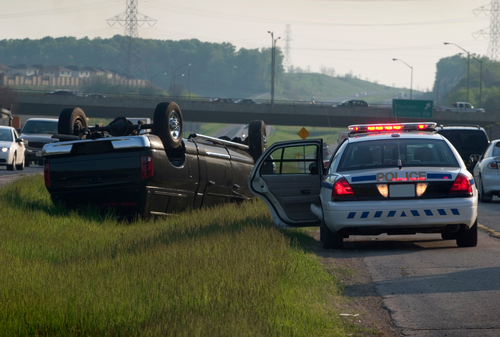At Chicago Personal Injury Centers, we understand that truck accidents are among the most serious and dangerous types of collisions on the road. The immense size and weight of commercial trucks, often weighing up to 80,000 pounds when fully loaded, make them far more hazardous than smaller vehicles like passenger cars.
When a truck is involved in an accident, the results can be devastating, often leading to severe injuries or fatalities for those involved. In this blog, we’ll explore the main factors that contribute to the severity of truck accident injuries and explain why these crashes often have such serious consequences.
Size and Weight of Trucks
The most significant factor in the severity of truck accidents is the enormous size and weight of the trucks themselves. When a commercial truck collides with a much smaller passenger vehicle, the smaller vehicle almost always sustains the most damage.
Impact of Truck Size
The size and weight of trucks generate far greater momentum and force than smaller cars. In an accident, this increased force is transferred to the smaller vehicle, causing substantial damage and more severe injuries for the occupants.
Whether it’s a side impact or a rear-end collision, the difference in size leaves passenger vehicles at a significant disadvantage. Even at lower speeds, the sheer mass of a truck can result in catastrophic damage to smaller vehicles.
Physics of Impact
The laws of physics play a major role in the severity of truck accidents. A fully loaded truck has much more momentum than a car, meaning it requires a longer distance to stop and generates more force during a collision. This additional force can lead to more extensive injuries, including traumatic brain injuries, broken bones, and internal injuries.
At Chicago Personal Injury Center, we frequently treat victims of these high-impact collisions, who often suffer long-term or life-changing injuries due to the sheer force of the accident.
Types of Truck Accidents That Cause Severe Injuries
Different types of truck accidents pose different risks, but several common scenarios tend to lead to the most severe injuries and fatalities.
Jackknife Accidents
In a jackknife accident, the truck’s trailer swings out to the side, forming a 90-degree angle with the cab. This often happens when the truck skids or loses traction, typically due to sudden braking or poor weather conditions.
When a truck jackknifes, it can block multiple lanes of traffic and cause multi-vehicle pileups. The force of the trailer swinging into other vehicles often results in serious injuries such as spinal injuries, fractures, and head trauma.
Rollover Accidents
Rollover accidents occur when a truck tips over, usually due to taking a sharp turn too quickly, an uneven load, or slippery road conditions. When a truck rolls over, it can crush smaller vehicles in its path, leading to serious injuries for those inside.
Rollovers are particularly dangerous because the size and weight of the truck can cause massive damage to any vehicles caught underneath or beside it.
Underride Accidents
One of the most deadly types of truck accidents is an underride accident, where a smaller vehicle slides underneath the trailer of a truck. This often happens in rear-end collisions or when a truck suddenly stops.
The top of the smaller vehicle can be crushed, leading to catastrophic injuries such as head trauma, brain injuries, and fatalities. These accidents are particularly dangerous for occupants of passenger vehicles, as the force of the collision can be fatal.
Longer Stopping Distances
Another key factor that makes truck accidents so dangerous is the longer stopping distance required by large commercial trucks. Trucks need much more distance to come to a complete stop compared to passenger vehicles, especially when traveling at highway speeds.
Braking Distance
A fully loaded truck requires 20-40% more distance to stop than a standard passenger vehicle. This longer braking distance means that in emergency situations, a truck driver may not be able to stop in time to avoid a collision, leading to serious rear-end accidents.
The force of a truck rear-ending a smaller vehicle can result in whiplash, spinal cord injuries, and even death for the occupants of the passenger vehicle.
Impact of Speed and Weather
Speed and weather conditions also play a significant role in truck accidents. Trucks that are speeding or driving in wet or icy conditions need even more distance to stop safely. In poor weather, the likelihood of a truck losing control or failing to stop in time increases, often resulting in multi-car pileups or severe collisions with smaller vehicles.
Driver Fatigue and Human Error
Driver fatigue and human error are common causes of truck accidents. Truck drivers often work long hours and may experience fatigue, even with regulations in place to limit driving times.
Driver Fatigue
Fatigue slows a driver’s reaction times and impairs decision-making, making it harder to respond quickly to changing road conditions or hazards. A fatigued truck driver may drift into other lanes, miss stop signals, or fail to brake in time, leading to devastating crashes.
Victims of these accidents often suffer from serious injuries, including broken bones, head trauma, and spinal injuries.
Human Error
Human error also plays a significant role in truck accidents. Distracted driving, improper lane changes, or failure to follow safety protocols can lead to collisions. When truck drivers make these kinds of mistakes, the consequences are often severe due to the size and weight of their vehicles.
Cargo-Related Issues
The way a truck’s cargo is loaded and secured can also play a significant role in truck accidents.
Improperly Secured Cargo
When cargo is improperly secured or overloaded, it can shift during transit, causing the truck to become unstable or even tip over. Shifting cargo can also lead to accidents if it causes the driver to lose control of the vehicle. These types of accidents can result in rollovers or collisions with other vehicles, leading to serious injuries for the victims.
Hazardous Materials
Trucks carrying hazardous materials pose additional risks in the event of an accident. A collision involving a truck carrying flammable or toxic substances can lead to explosions, fires, or chemical spills, resulting in life-threatening injuries such as burns or respiratory damage.
Suffering From Truck Accident Injuries? Start Your Recovery By Calling Us Today
Truck accidents are far more likely to result in severe injuries or fatalities due to the size and weight of the vehicles involved, the nature of the collisions, and various contributing factors such as driver fatigue, extended stopping distances, and cargo-related issues.
At Chicago Personal Injury Centers, we specialize in helping victims of truck accidents recover from their injuries and regain their quality of life. If you or a loved one has been involved in a truck accident, reach out to us today by calling (773) 482-5800 to learn how we can support your recovery journey.


